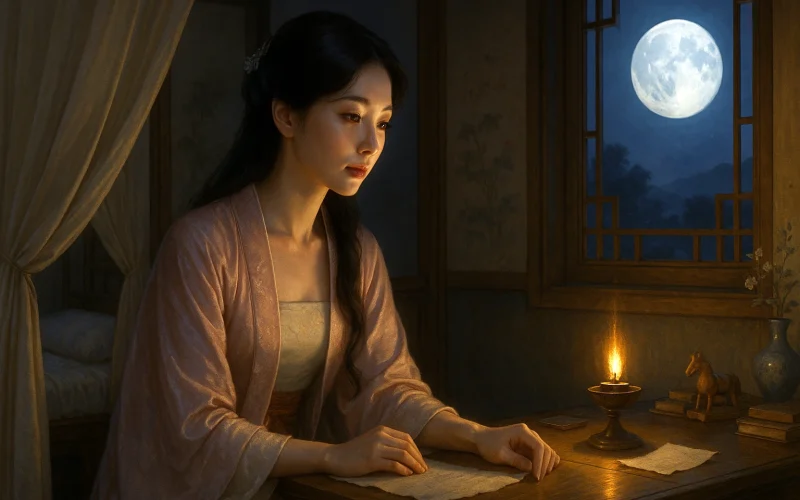Far off in Fu-chou she is watching the moonlight,
Watching it alone from the window of her chamber -
For our boy and girl, poor little babes,
Are too young to know where the Capital is.
Her cloudy hair is sweet with mist,
Her jade-white shoulder is cold in the moon.
...When shall we lie again, with no more tears,
Watching this bright light on our screen?
Original Poem:
「月夜」
杜甫
今夜鄜州月,闺中只独。
遥怜小儿女,未解忆长安。
香雾云鬟湿,清辉玉臂寒。
何时倚虚幌,双照泪痕干?
Interpretation:
On a Moon Lightnight was written in the autumn of 756 AD, during the reign of Emperor Xuanzong of the Tang Dynasty. At the time, Du Fu was trapped in the occupied capital of Chang'an, while his family resided in Qiang Village in Fuzhou. Although not imprisoned, Du Fu's movements were restricted, and his fate was uncertain. Overwhelmed by longing for his wife and children, he penned this deeply moving poem.
First Couplet: "今夜鄜州月,闺中只独看。"
Jīn yè Fūzhōu yuè, guī zhōng zhǐ dú kàn.
Tonight, the moon shines over Fuzhou; alone in her chamber, you gaze at it.
The poem begins not with the poet's own feelings but with an imagined scene of his wife gazing at the moon alone in Fuzhou. This "reverse perspective" technique highlights both the poet's pain at being separated from his family and his wife's longing for him, emphasizing their deep bond.
Second Couplet: "遥怜小儿女,未解忆长安。"
Yáo lián xiǎo érnǚ, wèi jiě yì Cháng'ān.
From afar, I pity our young children, who do not yet understand why their mother longs for Chang'an.
These lines express the poet's tender concern for his children, who are too young to comprehend their mother's sorrow. The contrast between the children's innocence and the mother's heavy heart deepens the sense of loneliness and melancholy.
Third Couplet: "香雾云鬟湿,清辉玉臂寒。"
Xiāng wù yún huán shī, qīng huī yù bì hán.
The fragrant mist dampens your cloud-like hair; the cold moonlight chills your jade-like arms.
Here, the poet vividly depicts his wife standing beneath the moon, her hair dampened by the mist and her arms chilled by the moonlight. This imagery conveys her enduring devotion and the depth of her longing, blending the凄凉 (desolate) atmosphere with the pain of separation.
Fourth Couplet: "何时倚虚幌,双照泪痕干?"
Hé shí yǐ xū huǎng, shuāng zhào lèi hén gān?
When will we lean together by the gauze curtain, bathed in moonlight, letting our tear stains dry?
The poem concludes with a poignant question, expressing the poet's fervent hope for reunion. The contrast between "alone" (独看) and "together" (双照) underscores the loneliness of separation and the yearning for togetherness. The mention of tear stains ties the poem's emotional thread together, leaving a lasting impression of shared sorrow and longing.
Overall Appreciation
This poem masterfully begins with the wife's solitary gaze and ends with the hope of shared moonlight, creating a unique and heartfelt structure. Instead of directly expressing his own longing, Du Fu imagines his wife's loneliness, her concern for their children, and her enduring devotion. The poem progresses from her solitary gaze to the children's innocence, then to her physical and emotional state, and finally to the poet's own longing for reunion. The emotional depth is profound yet restrained, making the poem both哀婉 (melancholic) and deeply moving.
Writing Characteristics
- Clever Structure and Layered Progression
The poem begins with the wife's solitary gaze and gradually unfolds her emotions, the children's innocence, and the poet's own longing, creating a layered and cohesive narrative. - Vivid Contrasts, Deep Emotion
The contrasts between "alone" and "together," and between the children's innocence and the mother's sorrow, heighten the emotional impact of separation. - Scenery as Emotional Anchor
The imagery of mist, moonlight, damp hair, and chilled arms blends the external environment with internal emotions, painting a细腻 (exquisite) portrait of the wife's longing. - Subtle Language, Lingering Resonance
The poem's gentle yet profound language conveys deep emotion with restraint, showcasing Du Fu's signature沉郁 (melancholic and introspective) style.
Insights
This poem is not only a touching expression of familial love but also a testament to the enduring strength of human connection in times of hardship. It reminds us that the bonds of family and the hope for reunion can sustain us through even the darkest times. Du Fu's longing for his family and his yearning for togetherness resonate as universal human emotions, offering solace and inspiration across the ages.
Poem translator:
Kiang Kanghu
About the poet

Du Fu (杜甫), 712 - 770 AD, was a great poet of the Tang Dynasty, known as the "Sage of Poetry". Born into a declining bureaucratic family, Du Fu had a rough life, and his turbulent and dislocated life made him keenly aware of the plight of the masses. Therefore, his poems were always closely related to the current affairs, reflecting the social life of that era in a more comprehensive way, with profound thoughts and a broad realm. In his poetic art, he was able to combine many styles, forming a unique style of "profound and thick", and becoming a great realist poet in the history of China.












